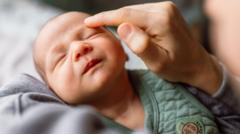Summary
UK scientists found that the first bacteria newborns encounter can lower the chances of them needing hospital treatment for lung infections. They discovered that a specific bacteria, Bifidobacterium longum, seemed to offer protection, but this was most common in babies born through vaginal delivery.
Key Facts
- UK scientists studied the first bacteria that newborns encounter.
- They collected stool samples from 1,082 newborns in their first week of life.
- Researchers tracked these babies for two years to check infection rates.
- Bifidobacterium longum, a type of bacteria, appeared to protect against lung infections.
- Only 4% of babies with Bifidobacterium longum needed hospital treatment for lung infections.
- These protective bacteria were mostly found in babies born vaginally, not by caesarean.
- The study does not support the practice of vaginal seeding for caesarean-born babies.
- Scientists aim to develop treatments, like probiotic yogurt, to build healthy microbiomes in babies.
